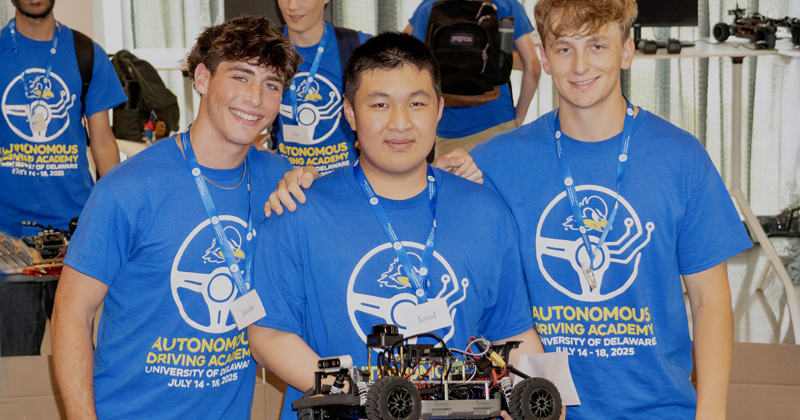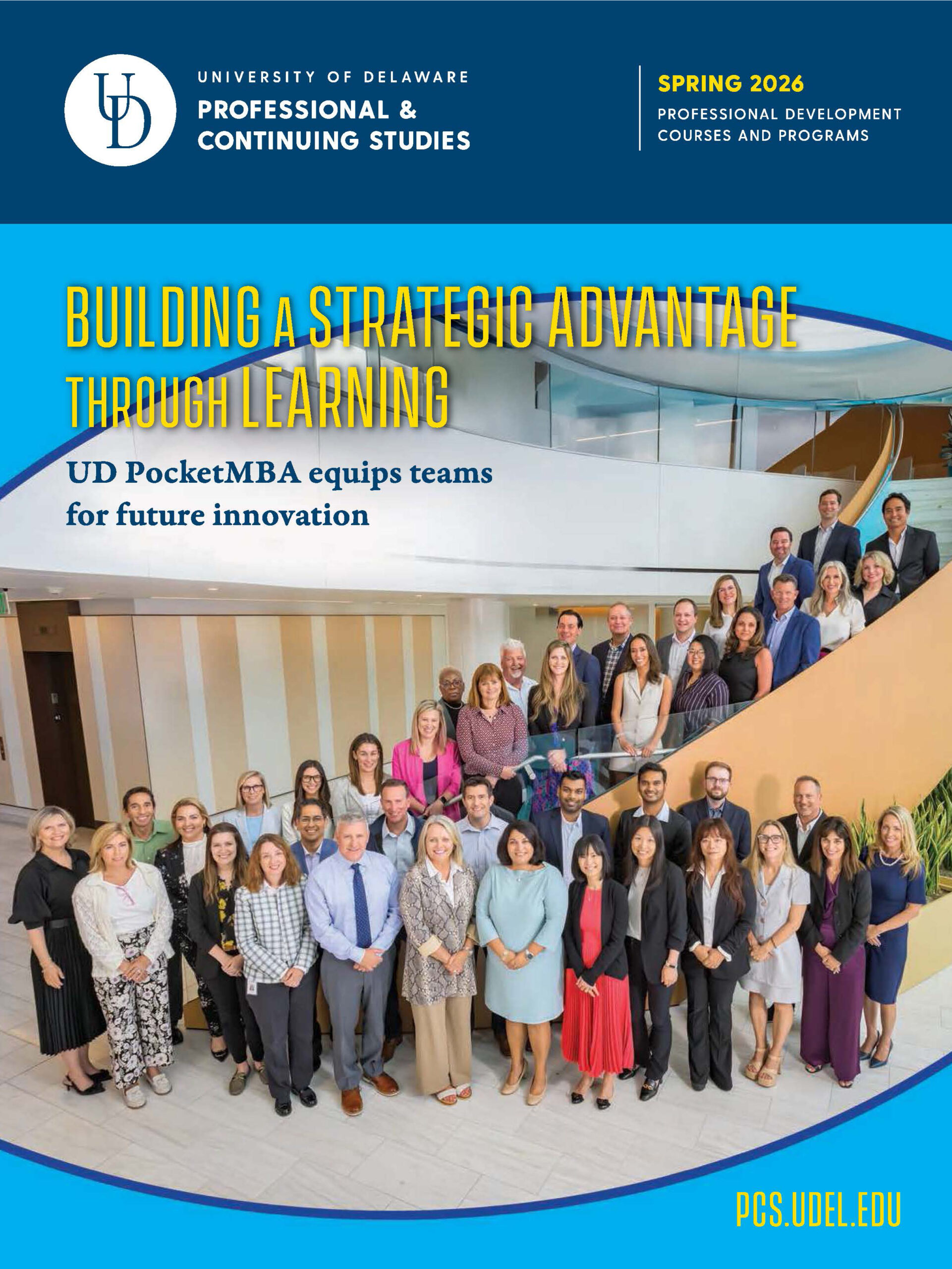
Who’ll be the one to crack the code and change the world? Will you be the one to kick-start the future of autonomous systems?
For rising high school sophomores, juniors and seniors interested in engineering, robotics, artificial intelligence, computer science and programming looking to advance their knowledge in the algorithms and software that enable autonomous vehicles.
July 6-10, 2026 (Monday-Friday)
University of Delaware Newark Campus
- Enhance your programming skills
- Gain a solid understanding of vehicle control, sensor control and autonomous driving systems
- Benefit from UD’s cutting edge research in autonomous driving
- Apply what you learn in hands-on projects that simulate real-world autonomous driving scenarios
- Receive a personalized program reference letter for your college application portfolio, plus a digital badge to display on social media or online profiles
- Potential financial options available—Discounts are available for dependents of military and veterans, UD employees and UD alumni, or two or more siblings from the same family; see details below.
Created in collaboration with the Connected and Autonomous Research Laboratory (CAR Lab) at the University of Delaware and UD’s Department of Computer and Information Sciences, our Autonomous Driving Academy Pre-College Program is a competitive, application-based, five-day program designed to immerse participants in the rapidly evolving field of autonomous vehicle technology. This noncredit pre-college course is tailored for high school students eager to gain a deep understanding of the core principles and practical applications of autonomous driving systems.
The course covers essential topics such as vehicle control fundamentals, sensor technology and the programming tools vital for autonomous systems, including ROS, Python and C++. Attendees will learn about the parts, pieces and systems of autonomous robots and work with a team to implement and optimize autonomous driving systems that simulate real-world autonomous driving scenarios.
Beyond technical skills, the program also fosters critical thinking, teamwork and presentation abilities. Students will have the chance to showcase their enhanced applications to peers and instructors, gaining valuable feedback and recognition for their innovations.
This program is a steppingstone for those aspiring to careers in automotive technology, robotics or related fields, offering both hands-on experience and professional insights into the latest industry advancements.
Students interested in this program must apply for admission.
See the Academy in Action
Get a glimpse of the hands-on learning and collaboration that define the Autonomous Driving Academy. This short video features participants engaging with cutting-edge technology, building skills and exploring real-world applications in autonomous systems.
Program Details
Autonomous Driving Pre-College Summer Program — Noncredit Program 
LOCATION: ICAT Lab at STAR Campus, University of Delaware, Newark, Del. – Housing is not provided; rooms can be reserved at the Baymont by Wyndham Newark I-95 at University of Delaware at a special group rate. At least one guest in each room must be 21 or older.
SCHEDULE: July 6-10, 2026, 9 a.m.-4 p.m., Monday-Friday
PRICE: $2,500, all materials included. Discounted price is $2,250 through April 1. Admitted students register with coupon code EBIRD.
REGISTRATION DEADLINE: June 1
NONCREDIT CONTACT HOURS: 3.0 CEUs | 30 Contact Hours
TECHNOLOGY REQUIREMENT: Students must bring their own laptop.
LUNCH: Students should bring their own lunch for the first four days of the program. Lunch is provided on the final day of the program.
Financial options available
Only one discount or scholarship award can apply per registration.
Registration by June 1 is required to order supplies.
EARLY REGISTRATION: Use coupon code EBIRD to receive a 10% discount when registering by April 1.
DISCOUNTS: A 15% discount is available for dependents of military and veterans, UD employees and UD alumni, or two or more siblings registering from the same family. For details or to receive the discount code, please email continuing-registration@udel.edu.
PARTIAL SCHOLARSHIPS: Partial need-based scholarships are available in the amount of a $625 scholarship award. Applications are accepted on a first-come, first-served basis. The application deadline is May 18.
Prerequisites
The ideal candidates will have a background in robotics and proficiency in Python with some knowledge of coding in C++. Students will be given coding exercises but will not need to code from scratch. Instead, they will receive prompts where they can use resources like Google or ChatGPT for help.
Application process
During the application process, each applicant should be prepared to submit a short, 250-word (maximum), essay explaining why they’re interested in robotics. We encourage applicants to share links to their GitHub accounts or portfolios. First priority will be given to those taking high school robotics, honors and AP level courses and comfortable using coding.
Course outline
Monday
Topics:
- Introduction to the hardware of autonomous robots
- Safety protocols
- Vehicle control fundamentals
- Sensing technologies overview
Activities:
- Assembling autonomous robot kits in groups
- Testing the robot’s control and reading sensor data
Tuesday
Topics:
- Autonomous driving system fundamentals
- Programming tools overview: ROS, Python, C++
- Key autonomous driving functions: mapping, localization, path planning
Activities:
- Installation of ROS and autonomous driving packages
Wednesday
Topics:
- Autonomous racing and parking systems
- Optimization techniques for racing, including trajectory optimization and reinforcement learning
Activities:
- Hands-on baseline implementation of autonomous racing application
- Optimization of the baseline implementation
Thursday
Topics:
- Autonomous parking systems
Activities:
- Continuing hands-on optimizing the racing system
- Hands-on autonomous parking system implementation
Friday
Competition Day
Participants will put their knowledge and skills to the test in an exciting, high-energy racing challenge. After four days of hands-on learning, they will race their autonomous vehicles on a track, showcasing their custom-built designs and problem-solving abilities. It’s not just about speed — teams will be judged on the creativity and technical execution of their systems, with the team achieving the fastest time taking home the win! This final event emphasizes real-world applications of autonomous driving technology, providing students with a unique opportunity to see their hard work come to life in a dynamic and competitive environment.
Learner outcomes
Participants in this program will:
- Develop skills in programming tools such as ROS, Python and C++, essential for implementing and troubleshooting autonomous driving algorithms.
- Implement and enhance autonomous parking and racing applications, focusing on performance optimization and efficiency.
- Apply theoretical knowledge in practical, hands-on projects that simulate real-world autonomous driving scenarios.
- Work effectively in teams to design, build and improve autonomous driving systems, fostering a collaborative learning environment.
- Prepare and deliver technical presentations showcasing project outcomes and innovations to an audience, honing communication skills.
- Gain insights into potential career paths in the rapidly growing autonomous driving and robotics sectors.
- Develop critical thinking and problem-solving abilities in a cutting-edge technological context.
- Enhance teamwork, leadership and communication skills through collaborative group projects.
Instructional team
Weisong Shi is an Alumni Distinguished Professor and the chair of the Department of Computer and Information Sciences at UD who founded the Connected and Autonomous Research Laboratory (CAR Lab) at UD in December 2017. Shi is an internationally renowned expert in edge computing, autonomous driving and connected health: His pioneer paper in the field, “Edge Computing: Vision and Challenges,” has been cited more than 7,500 times.
Before joining UD, Shi was a member of the computer science faculty at Wayne State University, where he held multiple administrative roles, including associate dean for research and graduate studies in the College of Engineering and interim chair of the computer science department. From 2013 to 2015, he served as a program director for the National Science Foundation (NSF). Currently, he is the editor in chief of Institute of Electrical and Electronics Engineers (IEEE) Internet Computing Magazine and Elsevier Smart Health. He is the founding steering committee chair of three conferences: the Association for Computing Machinery (ACM)/IEEE Symposium on Edge Computing (SEC), the IEEE/ACM International Conference on Connected Health (CHASE) and the IEEE International Conference on Mobility (MOST). Additionally, he is the general chair of ACM MobiCom ’24, the flagship conference on Mobile Computing and Wireless Networking. Shi is a fellow of IEEE, a distinguished scientist of ACM and a member of the NSF Computer and Information Science and Engineering Advisory Committee and Computing Community Consortium Council.
William He is a fourth-year doctoral student in the CAR Lab. His research is primarily at the intersection of autonomous driving and cyberphysical systems, focusing on building safe and reliable machine learning and simulation environments for autonomous vehicles and autonomous mobile robots. He has collaborated with researchers from Autoware, Ford, Western Digital, Blue Halo, Leidos, the Federal Highway Administration and Oak Ridge National Laboratory.
Arpan Bhattacharjee is a third-year doctoral student in the CAR Lab. His research interests include edge computing for connected and autonomous vehicles (CAVs), software over-the-air (OTA) updates and autonomous vehicle simulation and testing.
Ren Zhong is a doctoral student in computer science, with a focus on mapping and localization for autonomous driving. His research is centered on using crowdsourced data to dynamically update maps, improving both the timeliness and accuracy of mapping systems to develop safer and more efficient autonomous transportation technologies.


